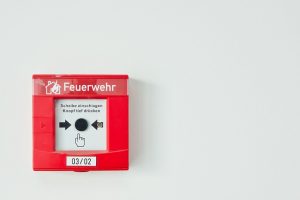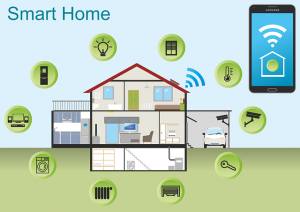
A fire alarm is a unit made of many devices, which uses visual and audio signal to warn people about a possible fire, smoke, or carbon monoxide occurrence in the region of coverage. Fire alarms are usually set in fire alarm systems to give zone coverage for commercial and residences buildings. There are institutes in Kochi which provides fire alarm system course in the automation training in Kochi.
The warning signal is either a loud siren/bell or a flashing light, or it can be both. Some fire alarm systems can warn by sending a voice message or making a phone call.
Depending on the functionality and the integrated components, there are many varieties of fire alarm systems.
The main classification include: Automatic fire alarm system, conventional fire alarm systems, addressable fire alarms, one stage and two stage fire alarm systems.
Automatics and Manual Fire alarm systems :
The automatic fire alarm systems works or are activated according to the working of the sensors including the fire or the heat sensors.
The manual fire alarm systems works or are activated with manual pull points.
Conventional and Addressable Fire alarm System :
The conventional fire alarm system works with as one single unit and unless inspected cannot detect the exact area of fire activation.
The addressable fire alarm system on the other hand has a dedicated address for each of the fire alarm connected to the control panel. These systems can easily detect the source of the fire caused.

conventional fire alarm system
One Stage and Two Stage Fire Alarm Systems:
The one stage fire alarm systems warns everyone within the building about the activation of a sensor. The two stage fire alarm systems warns only the authorized people regarding the breakout who can take up the action in the second stage.
This allows in preventing the panic and frightful response from the public in crowded places.
Working of a Fire Alarm System
Conventional Fire alarm systems make use of automatic system functions to detect the occurrence of any event that may lead to a fire breakout. These fire alarm systems receive a signal from any of the fire sensors and transmit it to fire alarm panel.
in wireless fire alarm systems, the signals are transmitted using radio frequency to the control panel.
Heat detectors usually have built-in thermistors to sense the heat. Carbon monoxide detectors use integrated chemical, electrochemical, opto-chemical or biomimetic cells to trace the gas. Smoke detectors use photo-electricity or ionization to detect smoke or combustion particles. Combined detectors use a number of detection mechanisms.
Learn more about the details of a fire alarm system used in high rise buildings from the leading automation training institute in kochi. Find the best resources for the course.
The fire alarm system then activates the sounders and then turns on the sprinklers or makes a call to the authorities. The source of the occurrence will be addressed to the control panel if the fire alarm system is addressable.
Features of Fire Alarm Systems

Advanced fire alarm system use wireless technology and smart devices to protect automated buildings using mobile app that can be managed using a smartphone. Smart wireless detectors use long-life batteries that can last up to 7 years. Users can activate, deactivate and assign fire alarm functions to each sensor from anywhere. Two big bonuses of most advanced fire alarms systems are the sleek design and the more pleasant audio warnings that don’t build upon the panic that’s already there.
